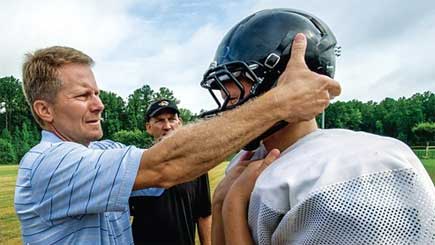Concussion Researcher to Address December Graduates
Posted on Oct. 31, 2013
Kevin Guskiewicz, left, is a world-renowned concussion expert. (Photo by Donn Young)
Kevin Guskiewicz, a world-renowned concussion expert and a 2011 MacArthur “genius grant” winner, will speak at UNC’s December Commencement ceremony.
“Kevin Guskiewicz’s bold and innovative approach to research on concussions makes contact sports safer for athletes of all ages,” Chancellor Carol Folt said. “He inspires others to think in new ways about safer play. His passion for advancing science and creating new knowledge about injury prevention excites our students. Kevin and his colleagues have made Carolina one of the nation’s leading centers of research on this important health issue.”
In August, Time magazine called Guskiewicz an “impact investigator” worthy of inclusion on its list of “Game Changers — America’s top innovators and problem-solvers.” His work has largely focused on improving safety in football, a sport he loves. He has studied concussions since he was a graduate assistant on the training staff of the Pittsburgh Steelers. He joined the University’s department of exercise and sport science in 1995 and served as head athletic trainer for the women’s lacrosse team for three years. In 1998, he became director of the concussion-testing program for all UNC teams.
Guskiewicz, whose life and work were featured as the cover story in the September/October 2013 issue of Carolina Alumni Review, is the founding director of the Matthew Gfeller Sport-Related Traumatic Brain Injury Research Center and research director for the Center for the Study of Retired Athletes. He leads the NFL’s subcommittee on safety equipment and playing rules and has been working with the league over the past decade to develop safer ways to play the game.
At Carolina, Guskiewicz’s long-term epidemiological study on hundreds of retired football players uncovered a correlation between the number of concussions a player suffered and the appearance of dementia, depression and other brain dysfunction later in life.
To make football a safer sport, Guskiewicz convinced ESPN to cancel a Sunday night feature on the most spectacular hits of the day’s NFL games. He also helped persuade the NFL to move kickoffs from the 30-yard line to the 35-yard line, resulting in 33 percent more no-hit touchbacks the following season.
Guskiewicz’s work earned him the MacArthur Foundation award in 2011. The John D. and Catherine T. MacArthur Foundation of Chicago provides an unrestricted award to talented individuals who have shown extraordinary originality, creativity and the potential to make important future contributions. The fellows, nominated anonymously by leaders in their respective fields, each receive a total of $500,000 in “no-strings attached” support over five years.
Guskiewicz has used part of that award to work with the military on concussions that are caused by blast injuries. Those collaborations have focused on helping the military quickly and effectively identify the seriousness of injuries and recovery times so that a soldier can be sent to an appropriate treatment location for care.
Folt selected Guskiewicz, Kenan Distinguished Professor of exercise and sport science and senior associate dean in the College of Arts and Sciences, in consultation with the Commencement Speaker Selection Committee, which includes students and faculty. His selection continues Carolina’s tradition of highlighting faculty speakers at December Commencement.
More online…
- An Impact on the Game: Get out on that field and hit somebody? Fine, Kevin Guskiewicz says. Let’s just look for ways to do it more safely. From the September/October 2013 Carolina Alumni Review, available online to Carolina Alumni members.
- Concussion Researcher Named MacArthur Fellow
September 2011 news report - UNC Hosting Program Highlighting Concussions
News report fromm January 2011 - High-Tech Helmets Show Impact of Hits to the Head
News report from December 2007 - Born of Tragedy, A Pioneer for Players: How sports medicine has evolved at Carolina.
From the November/December 2005 issue of the Carolina Alumni Review, available online to Carolina Alumni members. - The Dark Aftermath of Glory: Retired athletes often limp off the field. Kevin Guskiewicz is trying to help — and maybe change the way active players are treated. From the May/June 2004 issue of the Carolina Alumni Review, available online to Carolina Alumni members.
- Making Sports Safer: With the intent of taking the guesswork out of deciding when athletes with head injuries can safely resume playing, then-assistant professor Kevin Guskiewicz received an $84,000, two-year grant to study the effects of mild head injuries on athletes’ balance and mental functions such as attention span, memory and concentration. From the November/December 1996 issue of the Carolina Alumni Review, available online to Carolina Alumni members.
